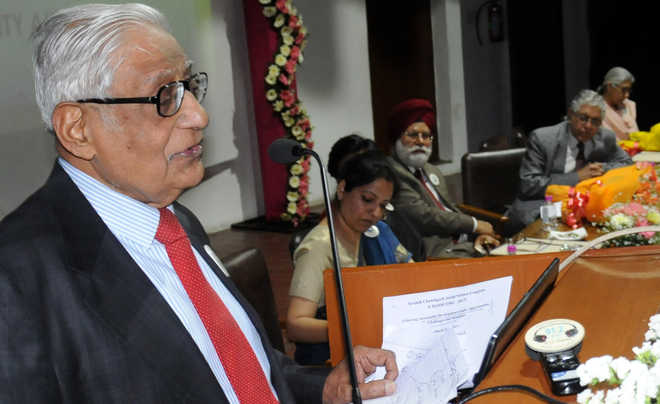Policy makers should focus on youth from deprived sections: Veteran journalist HK Dua
Tribune News Service
New Delhi, November 16
Veteran journalist HK Dua on Saturday evening cautioned policy makers of a possible social problem created by jobs failing to keep pace with burgeoning number of educated youth, especially from the have-not sections of society.
Dua, who was speaking at the release of a book ‘From Shanties to School-A Silent Movement’, authored by Dr Manimala Roy, principal of local school, Basava, said the deprived sections of youth , especially migrants, wanted better jobs.
“There will be problems. The animal spirit of the Indian economy, which is in a phase of slumber, must wake up—the sooner it took on board the increasing swathe of aspirational youth, the better,” Dua said.
He urged the NITI Ayog to not just prescribe policies, but to also ensure their implementation.
Dinesh Singh, former vice-chancellor of Delhi University and a recipient of the Padma Shri award, said a large number of people, such as street vendors, who contributed to the economy at a subterranean level, were largely ignored by the policy makers.
Singh underscored the importance of India’s New Economic Policy of 1991 as a major and progressive milestone in the annals of modern India. He also appreciated the theme and findings of the book.
Roy’s book focuses on deep linkages between early schooling and availability of white-collar jobs. The book is based on study mainly of demography in “jhhugi” clusters in Delhi.
Citing a study conducted in 1998 by then Planning Commisssion, the book points out that 43 per cent of the people registered with Delhi Employment Exchange were from the states of Uttar Pradesh, Bihar, Uttarakhand, Haryana , Rajasthan, Punjab, West Bengal and Jharkhand.
The book further says that migration from Bihar alone went up by 75.77 per cent between 1991 and 2001.Simultaneously, slum literacy in Delhi rose from 57.18 per cent in 1991 to 64.4 per cent in 2001.









